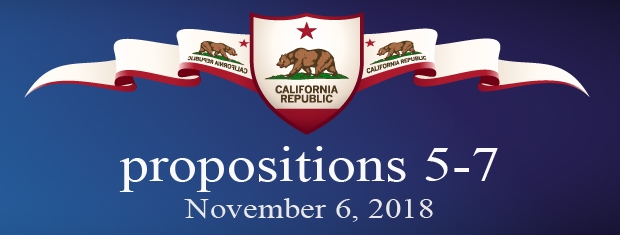California Ballot Guide 2018: Propositions 5-7
This is Part Two in our series regarding the California Ballot for November, 2018. In this series, we provide a synopsis of each of the 11 propositions voters in this state will see on the ballot, and summarize the primary arguments for and against each measure.
Click California’s Propositions 1-4 to get caught up or review.
Or you may move forward to ballot Propositions 8-12.

In this segment, we’ll take a look at the pros and cons of Propositions 5 through 7:
Proposition 5: Property Tax Transfer Initiative, a/k/a/ People’s Initiative to Protect Proposition 13 Savings, Version 3
Like a few other ballot measures this year, the Property Tax Transfer Initiative aims to combat California’s housing crisis.
In effect, Prop 5 will allow homebuyers who are either over the age of 55 or disabled to transfer tax assessments from a prior home to a new home. The transfer will not be affected by the market value in the new neighborhood. It also won’t matter how many times the homebuyer has moved.
This measure further amends Proposition 13 (the Tax Limitations Initiative) of 1978 – which limits property taxes to one percent of assessed value and caps rate increases at two percent annually, despite the property’s appreciation over time. Prop 13 was previously amended in 1986 (Prop 60), and 1988 (Prop 90).
Voting Yes on Prop 5:
Groups like the California Chamber of Commerce and California Association of Realtors endorse Proposition 5 claiming the measure will free up housing. Seniors in particular, who may wish to downsize their homes but won’t do so because of today’s much higher tax rates, will feel more inclined to sell and move.
Voting No on Prop 5:
Opponents of Proposition 5 contend the measure doesn’t increase housing supply, and merely makes the wealthy wealthier – as affluent homeowners will gain a huge tax break. Current law in California allows homeowners to transfer property tax assessments only once, and only if the new home is not as valuable as the prior home. Additionally, current law lets the counties decide if tax assessments can be transferred – Prop 5 takes that privilege to the state, which means counties may lose revenue for schools and other public services.
Proposition 6: Voter Approval for Increases in Gas and Car Tax, a/k/a Eliminates Certain Road Repair and Transportation Funding
Let’s call this the “Repeal and Replace” measure. Prop 6 intends to repeal certain gas, diesel and vehicle taxes imposed last year, chiefly, the Road Repair and Accountability Act of 2017. The measure is retroactive to January 1, 2017.
The “Replace” component is the state government’s ability to impose such taxes simply with a two-thirds vote of the legislature plus the governor’s signature. Proposition 6 will change that system to add voter approval as a requirement to that process.
Nothing is ever so simple in California, as you’ll see when reading the pros and cons arguments below.
Voting Yes on Prop 6:
Proponents of Proposition 6 contend gas and car tax increases are costing Californians too much money, estimating $780 per year for the average family of four, and that these rates will increase annually. Additionally, the money raised doesn’t necessarily go towards road repairs, as the government uses the revenue to cover budget deficits in other programs – or that certain employees (CalTrans for example) are getting paid for other reasons, not necessarily to repair old or build new roads.
Voting No on Prop 6
Those who oppose Proposition 6 claim the loss of the tax revenue will postpone much-needed infrastructure improvements, thus endangering California drivers. They cite a cost of $844 per year in repairs per vehicle, due to damages caused by bad roads. Additionally, the tax increases on gas, diesel and vehicles are needed to cover a budget shortfall, given the popularity of more fuel-efficient transportation methods. Last, the opponents claim this measure is a politically-motivated initiative – partially funded by key members of the Republican Party in other states – to increase turnout of GOP voters in California.
Proposition 7: Conforms California Daylight Saving Time to Federal Law, a/k/a Permanent Daylight Saving Time Measure
If passed, Daylight Saving Time would conform to time zones set by federal law. The initiative could also permit “Permanent Daylight Saving Time” if federal law allows, thus ending the twice yearly time changes of “Springing Forward” or “Falling Back” one hour. Californians could then observe non-changing time zones like Arizona and Hawaii.
Prop 7 would repeal California’s Daylight Saving Time Act of 1949.
Voting Yes on Prop 7
Groups that want Proposition 7 to pass say springing forward and falling back each year is pointless. Worse, it’s tiring and bad for health. Research shows that such disruptions to circadian rhythms can increase the risk of heart attacks and strokes, particularly for cancer patients and seniors, and causes more car accidents.
Voting No on Prop 7
Opponents of Proposition 7 contend the measure will hurt school children. They say that if the state abolishes the time changes, children will be traveling to school (walking, biking, or waiting for busses) in the dark during the winter months. It will also hurt businesses who deal with clients and partners in other time zones, as adjustments will need to be made. Airlines in particular will be hit with higher costs if they need to adjust flight schedules.
Next in our California ballot guide, Propositions 8-12.
Stephen T. Holzer is a business litigator and the Chair of our Environmental Practice Group.
Disclaimer:
This Blog/Web Site is made available by the lawyer or law firm publisher for educational purposes only, to provide general information and a general understanding of the law, not to provide specific legal advice. By using this blog site you understand there is no attorney client relationship between you and the Blog/Web Site publisher. The Blog/Web Site should not be used as a substitute for obtaining legal advice from a licensed professional attorney in your state.
